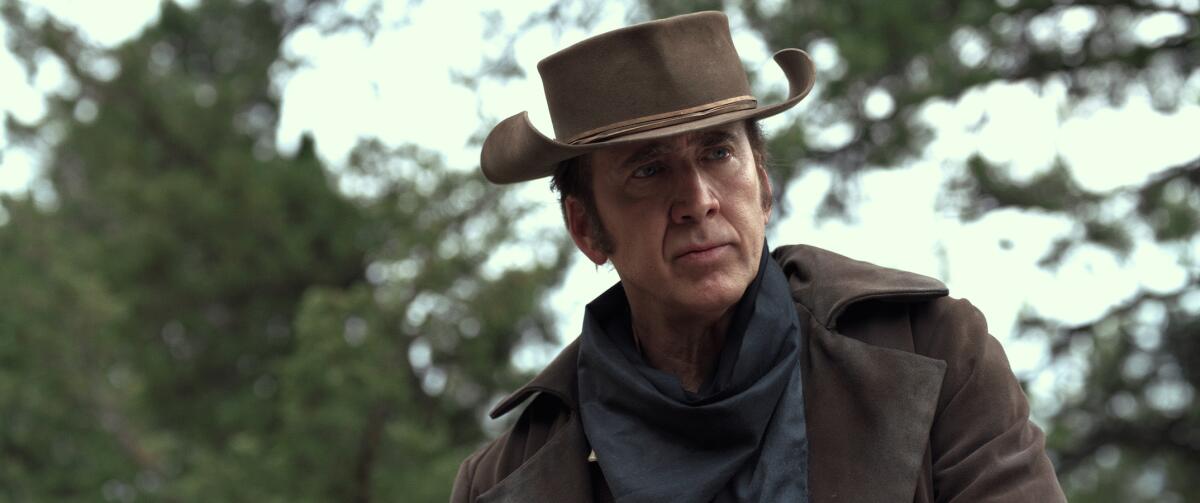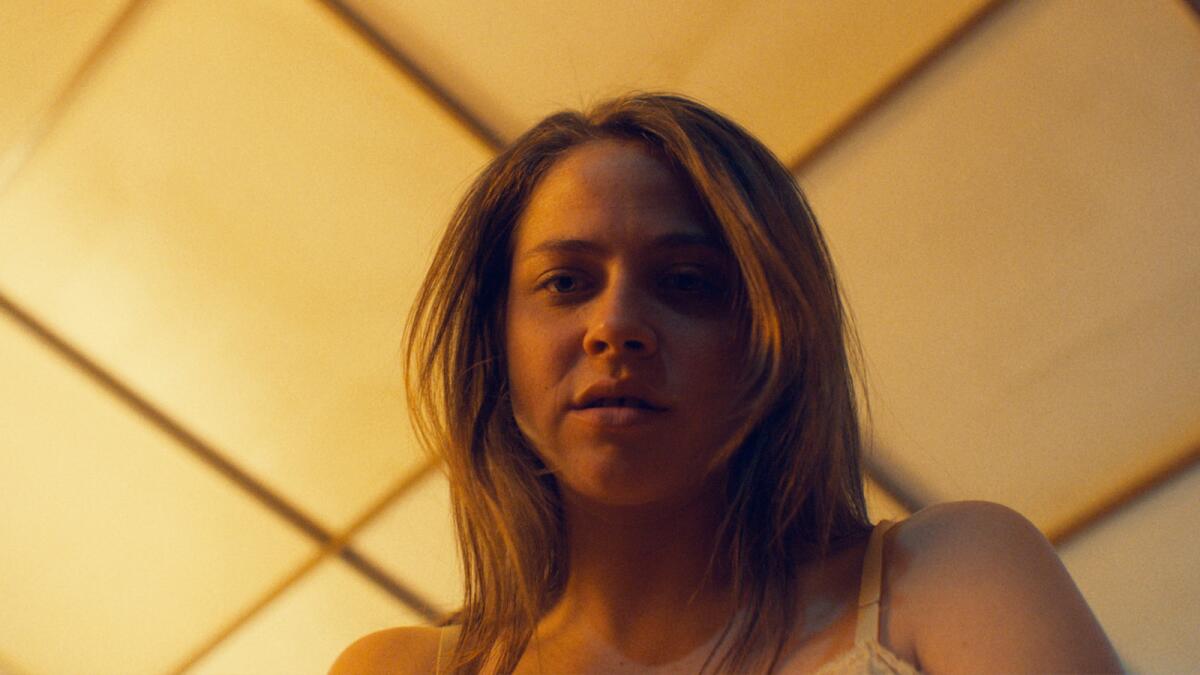Review: ‘The Drop’ doesn’t always work as a comedy, but it has the ring of hard-won truth

‘The Drop’
The title of director Sarah Adina Smith’s anxious social satire “The Drop” refers to a momentary mistake that becomes a life-altering embarrassment. Anna Konkle plays Lex, a sweet-natured middle-class Angeleno looking forward to a fun trip to a beachfront destination wedding with her husband and business partner, Mani (Jermaine Fowler), with whom she’s been running a hip bakery and trying to conceive a child. Then Lex accidentally drops a friend’s baby on the ground after a bee flies at her face; while the infant’s OK, the incident prompts the party guests to rethink everything they know about one another.
Co-written by Smith and Joshua Leonard, “The Drop” relies heavily on the improvisational talents of an experienced cast of comic actors, including Leonard himself — as well as Utkarsh Ambudkar, Jillian Bell, Elisha Henig and Robin Thede. They play a mix of privileged L.A. types, who are all vaguely dissatisfied with their lots in life. A lot of the dialogue is about these people coming to that conclusion, through passive-aggressive conversations that are never quite as funny as they should be, no matter how much the movie leans into “Curb Your Enthusiasm”-style cringe humor.
Still, while “The Drop” doesn’t always work as a comedy, it does have the ring of hard-won truth. Smith and Leonard spoof the presumptions and pretensions of people who like to outwardly project as kindly and enlightened; and they unsparingly illustrate how someone’s seemingly rock-solid reputation can be undone in an instant.
‘The Drop.’ R, for sexual content, language and some drug use. 1 hour, 32 minutes. Available on Hulu

‘The Old Way’
The Nicolas Cage vehicle “The Old Way” has been described as the actor’s “first-ever western,” which is sort of true, in that he’s never before played someone living out on the American frontier with hats, guns, horses and all that. But it’s also true that a lot of Cage’s recent work — like “Prisoners of the Ghostland,” “Mandy,” “Pig” and more — has been at least western-adjacent, in that they’re movies about haunted loners out for revenge.
That’s the zone Cage returns to in “The Old Way,” playing Colton Briggs, a reformed gunfighter who gets pushed too far when a vengeful gang tracks him down and kills his wife, leaving Colton to raise their young daughter, Brooke (Ryan Kiera Armstrong). Without the civilizing influence of true love, the widower returns to his roots, teaching Brooke how to track, shoot and lie. Ironically, their quest to execute the other outlaws brings the father and child closer than they’ve ever been.
Director Brett Donowho and screenwriter Carl W. Lucas could have done more with this premise. Their story is slim, moving directly from the very basic setup to a predictable payoff that sees Colton facing off against a young killer (Noah Le Gros), who has a very particular reason to ruin the gunslinger’s life. But the locations have some appealing old-school western grandeur; and the chemistry between Cage and Armstrong carries the picture through its more hackneyed moments. Ultimately, this is a movie with real personality, about a man coming to realize with no small amazement that he has an actual legacy to pass on — even if it’s a grim one.
‘The Old Way.’ R, for violence. 1 hour, 35 minutes. Available on VOD; also playing in limited theatrical release
—

‘Candy Land’
The talented genre filmmaker John Swab brings a distinctive touch to the ’70s-style exploitation picture “Candy Land,” a gamy mystery thriller that combines a slasher plot with a frank exposé of the lives of “lot lizards” — the prostitutes who ply their trade at truck stops. Olivia Luccardi plays Remy, an exile from a Christian cult who finds a makeshift family among the male and female hookers at a run-down spot in rural Oklahoma. Just as her new friends are showing her how their business works, the gas station and nearby motel start to be terrorized by a blade-wielding killer, who is cutting up both the hustlers and their johns.
Swab doesn’t keep the murderer’s identity secret for long. About halfway through its running time, “Candy Land” essentially dispenses with its plot and turns into a series of scenes in which the psychopath openly dispatches one victim after another, with a messianic zeal. Throughout these sequences, Swab delivers the grindhouse goods, serving up hefty amounts of nudity and gore.
Yet while “Candy Land” is unapologetically sleazy, it also has a sharp visual style and a fully realized little world, filled by a vibrant ensemble of sex-worker characters (well played by Sam Quartin, Eden Brolin, Virginia Rand, Owen Campbell and Guinevere Turner), one creepy lawman (played with gusto by William Baldwin) and fascinating details about the art and craft of sexually satisfying truck-stop customers. It’s possible Swab made this film just to tell a story about the more compassionate side of prostitution. If so, the movie’s guilty-pleasure thrills are just a bonus.
‘Candy Land.’ Not rated. 1 hour, 33 minutes. Available on VOD
‘Come Find Me’
On the surface, writer-director Daniel Poliner’s “Come Find Me” may seem like a typical tearjerking indie drama. The first half is about a stressed-out young lawyer named Christina (Victoria Cartegena), who is back in her home city of New York to work on a big case while trying to avoid her meddling mother, Gloria (Sol Miranda). The second half jumps ahead a couple of years to Gloria’s last days as a middle-school principal, which she juggles while preparing for Christina’s wedding. This bifurcated structure — along with a late-film introduction of a time-loop element — are indicative of Poliner’s more subtle ambitions with this picture, about how personal goals and relationships evolve.
Not everything Poliner tries here succeeds — especially in the film’s first half, which can be hard to follow at times. But the story gets better as it plays out, and the dialogue and performances are uniformly strong, helped along by the accumulation of information about Gloria’s and Christina’s jobs and their history together. If the movie feels a bit overstuffed, that may be because Poliner clearly cares about these characters, and — quite touchingly — has thought a lot about what would make them happy.
‘Come Find Me.’ Not rated. 1 hour, 47 minutes. Available on VOD
‘The Offering’
There’s a welcome simplicity to director Oliver Park and screenwriter Hank Hoffman’s “The Offering,” a supernatural thriller that replaces the genre’s usual generic Christian mysticism with a Jewish take on curses and devils. Nick Blood plays Art, who left his Orthodox family to marry the gentile Claire (Emily Wiseman), but then returns to his father, Saul (Allan Corduner), when he needs money to help with his pregnant wife and their unborn child. Unfortunately, Art arrives at Saul’s place of business — a mortuary — just as a child-stealing, hallucination-inducing demon known as the Abyzou has been conjured. Most of the action in “The Offering” takes place in and around the family’s funeral home, where a few freaky incidents turn into full-on Abyzou attacks. The plot is pretty routine, but its finer points about religious faith and rituals give the creep-outs and jump-scares real nuance. What makes this such a satisfying horror film is its cultural specificity.
‘The Offering.’ R, for violence. 1 hour, 33 minutes. Available on VOD; also playing theatrically, Alamo Drafthouse Cinema, downtown Los Angeles
‘The Price We Pay’
The grim and gory “The Price We Pay” belongs to the subgenre of horror films like “Don’t Breathe” and “From Dusk Till Dawn,” where some not-so-nice people show up at the wrong place at the wrong time, and soon find out what true evil is. Here, Emile Hirsch and Stephen Dorff play fugitive crooks who take a hostage after a holdup gone haywire, and then attempt to lie low at a farm. There, the thieves discover the property’s secret torture chamber — and that the folks who own the place aren’t exactly pushovers. Directed by Ryûhei Kitamura (best known for “The Midnight Meat Train”) from a Christopher Jolley screenplay, “The Price We Pay” lacks the shocking twists and lively performances of the best “knock on the wrong door” thrillers. The cast is fine, but there’s a dispiriting dourness to the film. Nevertheless, after a slow start, Kitamura does offer up some impressive splatter scenes — peaking at the end, with a wild climax that partly justifies the movie’s existence.
‘The Price We Pay.’ R, for strong horror violence, gore and pervasive language. 1 hour, 26 minutes. Available on VOD
Also on VOD
“The Celluloid Bordello” is a provocative documentary essay about the many different ways that movies and television have depicted prostitutes and strippers across the decades, in ways sometimes bracingly honest but more often exaggerated and exploitative. Directed by Juliana Piccillo, the film is loaded with clips, strung together with interviews in which critics and sex workers offer insights into pop culture’s love-hate relationship with the people who sell their bodies for a living. Available on VOD (also available on DVD from First Run Features)
Available now on DVD and Blu-ray
“She Said” stars Carey Mulligan as Megan Twohey and Zoe Kazan as Jodi Kantor in a hard-hitting journalism drama that looks back at how these two New York Times reporters pursued the rumors and allegations against movie producer Harvey Weinstein, while struggling to get his accusers to go on the record. The DVD and Blu-ray editions add a featurette in which Twohey and Kantor tell the story behind the story. Universal (also available to stream on Peacock)
More to Read
Only good movies
Get the Indie Focus newsletter, Mark Olsen's weekly guide to the world of cinema.
You may occasionally receive promotional content from the Los Angeles Times.










